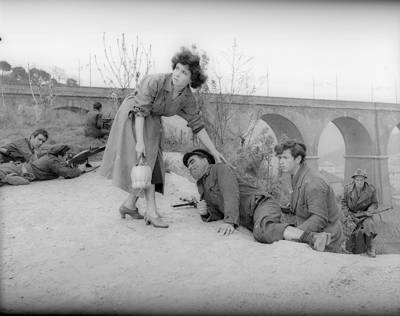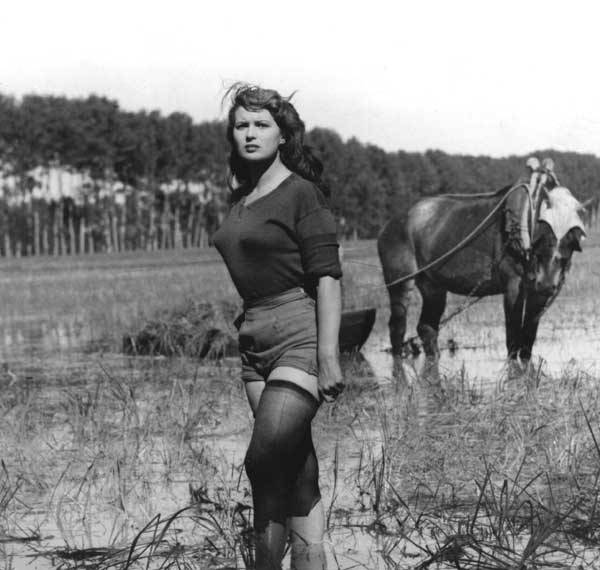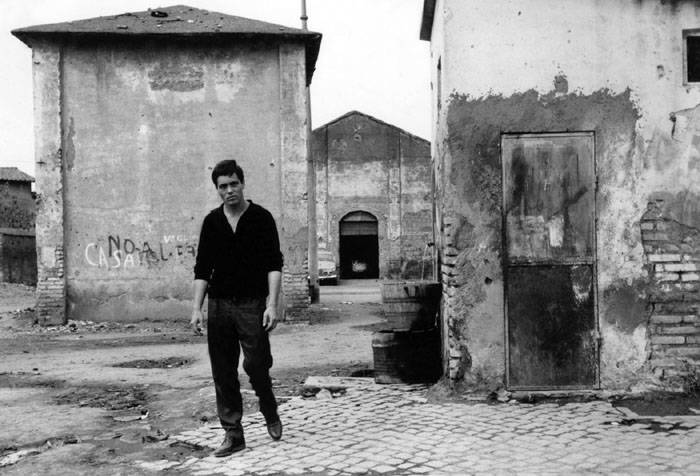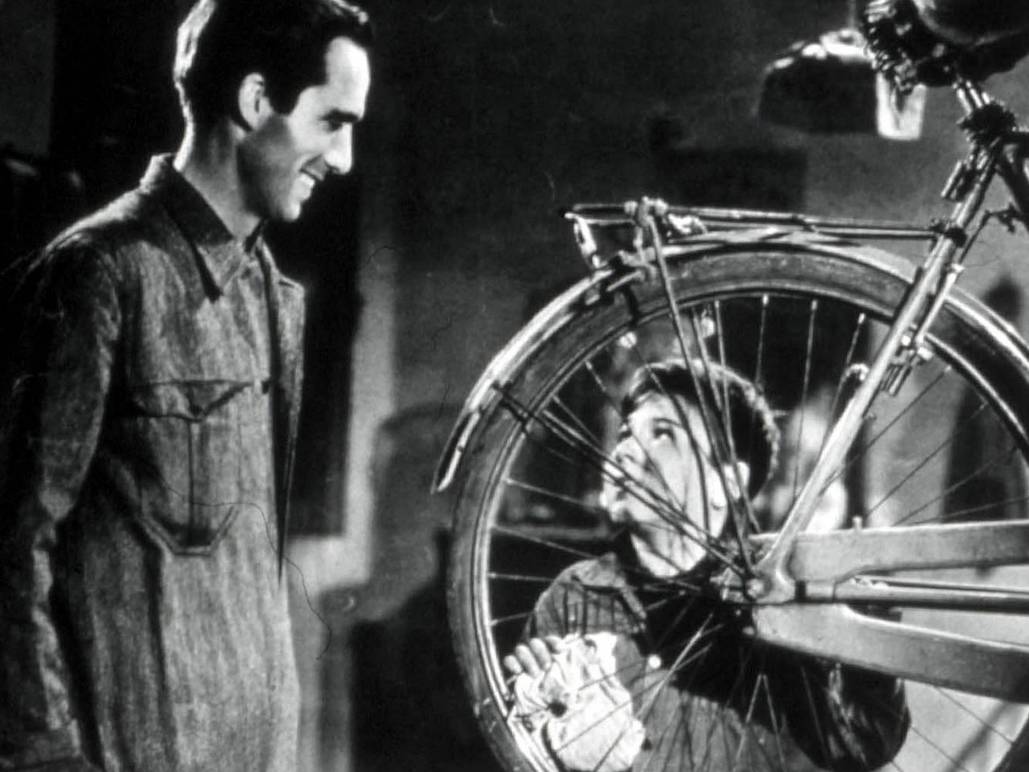Italian Neorealism in NY. Life Lessons at the Lincoln Center’s Walter Reade Theater
The Film Society of Lincoln Center, in association with Cinecittà Luce, and the Fondazione Centro Sperimentale di Cinematografia-Cineteca Nazionale, are presenting the most complete series on Italian Neorealism ever screened in New York, "Life Lessons: Italian Neorealism and the Birth of Modern Cinema", a month-long (last day is November 25th) 40-film series on the film movement from postwar Italy.
“Birthed from the ashes and rubble-strewn landscapes of 1940s Italy, Neorealist films were both unique stylistically and thematically. Shot on location, using available light, casting non-professional actors, these films were revolutionary also for their candid depictions of the working class. Not only would the movement elevate the artform from simple entertainment, but it opened a dialogue about the future of Italy as well as creating films of extraordinary power and humanity.
Although its roots arguably go back to Luchino Visconti's Ossessione (the first
adaptation of James M. Cain's pulp novel The Postman (Always Rings Twice) or even to works of the thirties by Mario Camerini and Alessandro Blassetti, and even Jean Renoir (his film Toni was a direct precursor to Neorealism), it was really the worldwide success of Roberto Rossellini's Open City (Roma città aperta) that would make a lasting impact and influence.
Over the years, this
extraordinarily rich, multi-faceted and even contentious movement has largely become reduced to a shorthand made up of a few key films-masterworks, but still just a small taste of the range and quality of work going on in Italy in the immediate postwar period and into the sixties.
The Film Society together with Cinecittà Luce and the Fondazione Cineteca Nazionale in Rome offer this 40-film (re)assessment of this most crucial and influential of all great film movements; the great achievements of directors such as Alberto Lattuada (The Bandit, The Overcoat, Without Pity), Renato Castellani (Two Cents Worth of Hope, Under the Sun of Rome) Giuseppe De Santis (Bitter Rice, No Peace Under the Olive Trees, Rome Eleven O'Clock, Tragic Pursuit), among others can now be seen alongside the acknowledged masterworks of Rossellini (Open City, Paisan, Voyage to Italy) and De Sica (Bicycle Thieves, Miracle in Milan, Shoeshine, Umberto D.).
Works by directors who "passed through" neorealism on their ways to create different kinds of cinema are featured (Pietro Germi - In the Name of the Law, The Way of Hope; Federico Fellini - I Vitelloni), along with a brief selection of works by the movement's most prominent heirs: Vittorio De Seta (Bandits of Orgosolo), Ermanno Olmi (Il Posto), Francesco Rosi (Salvatore Giuliano) and Pier Paolo Pasolini (Accattone).”
With these words the Film Society presents the series and to know a bit more we sat down with Richard Peña, Program Director at the Film Society and had a chance to what’s behind this special event.
This is the biggest collection of Italian Norealism films ever presented in NY, how did it come about? How did you select the films?
At some point around 2000-2001, Antonio Monda, my former colleague Kent Jones, and I began talking about the limited image people had of Italian neorealism--how it had been reduced to a shorthand of 4 or 5 films, and how many masterworks of that movement were now forgotten. So we began drawing up dream lists of a "definitve" neorealist show, and here we are. I'd hardly claim it's definitive, but it's a great list and I'm very proud of it.
How important is it to showcase the work of the lesser known filmmakers?
Lesser known of course is not an aesthetic evaluation of their work. Many of the directors here who are largely unknow to US audiences were very important figures in their time. The great French critic André Bazin thought Renato Castellani's Two Cents Worth of Hope was one of the great masterpieces of neorealism, but who sees that film today? It's hoped that through this series audiences and students of film will see how broad a complex a movement noerealism was.
Few other periods of film history are so deeply influenced by the political ideal and social history of their time, would it ever be possible to bring it back?
To an extent it's never gone away, and there are certainly contemporary directors both in Italy (Gianni Amelio, Vincenzo Marra, etc.) and outside of Italy (the whole Iranian "new wave") who are the proud descendents of neorealism. Films, meanwhile, will continue to be affected by social and political currents; what was different about NR perhaps was the desire of the filmmakers to be very much part through their films of a national dialog about the future of their country.
Are there any films presented here that you feel closer to as a film expert and as a person?
Obviously with 40+ films there are some which I personally like more than others, although I'm delighted to have every film that we have in the program. I love OSSESSIONE and OPEN CITY, of course, and have for years, but it was only in organizing this show that I rediscovered for myself MIRACLE IN MILAN, which I think is really a knockout. I think SUNDAY IN AUGUST, WITHOUT PITY and PATH OF HOPE are all major films that have been shamefully neglected. I could go on, but....
As the Program Director of the Film Society of the Lincoln Centre, what is your mission?
The mission of the Film Society is to celebrate and promote film as art. We do that both by examining film broadly--with the greatest possible international scope--and in depth, offering series and retrospective that focus on the development of a national cinema, film artist, production company or even film genre. To wit, we're in the "film history business" hoping that what we show will have an impact on how both contemporary and classic film art is understood and appreciated.
**********
Italian Neorealism: The Program Guide
October 30 - November 25, 2009
See every film in the series for only $99 ($79 Members & Students/$89 Seniors). Purchase an All-Access Pass online or at the box office!
During most of the month of November, the Film Society invites you to experience one of the most influential film movements of all time: Italian Neorealism. Whether these films are new to you, or you are a long-time connoisseur, there are plenty of discoveries to make during this unique series.
Use this program guide to help make program selections.
Explore:
• The Essentials >>
• Marquee Names >>
• Life During Wartime >>
• The Italian Roots of the Crime Film >>
• Comedies >>
• Connoisseur’s Picks >>
THE ESSENTIALS
To see how Italian Neorealism shaped generations of filmmakers, start your exploration here, with these landmark works:
Open City
Bicycle Thieves
Paisan
Umberto D.
MARQUEE NAMES
See the works that put these titanic talents, from both behind and in front of the camera, on the map.
MAJOR DIRECTORS
Pier Paolo Pasolini: ACCATTONE
Frederico Fellini: I VITELLONI
Michaelangelo Antonioni: IL GRIDO
Ermanno Olmi: THE JOB
Roberto Rossellini: OPEN CITY, PAISAN & VOYAGE IN ITALY
Luchino Visconti: OSSESSIONE & LA TERRA TREMA
Vittorio de Sica: BICYCLE THIEVES, MIRACLE IN MILAN UMBERTO D., & SHOESHINE
MAJOR STARS
Gina Lollabrigida: ATTENTION! BANDITS! & BREAD LOVE AND DREAMS
Anna Magnani: THE BANDIT & OPEN CITY
Vittorio Gassman and Silvia Mangano: BITTER RICE
Alberto Sordi: I VITELLONI
Marcello Mastroianni: SUNDAY IN AUGUST & CHRONICLE OF POOR LOVERS
Ingrid Bergman: VOYAGE TO ITALY
LIFE DURING WARTIME
Born during the tumultuous aftermath of World War II, Neorealism celebrated everyday sorrows, triumphs and struggles. These selections give an excellent insight into that pivotal time:
Attention! Bandits!
A Day in the Life
Days of Glory
Paisan
Open City
Outcry
The Italian Roots of the Crime Film
Long before Francis Ford Coppola took us on a journey deep into the cultures and rituals of the Sicilian mafia, these films treated the Italian criminal underworld.
The Bandit
The City Stands Trial
In the Name of the Law
The Tragic Pursuit
Salvatore Giuliano
COMEDIES
See the lighter side of the influential film movement with these delightful selections:
Miracle in Milan
Bread, Love and Dreams
The Overcoat
CONNOISSEUR'S PICS
Go deeper into the genre with this rarely screened gems and influential picks.
Heaven Over the Marshes
The Sky is Red
The Earth Cries Out
Rome 11:00
Women Without Names










































i-Italy
Facebook
Google+
This work may not be reproduced, in whole or in part, without prior written permission.
Questo lavoro non può essere riprodotto, in tutto o in parte, senza permesso scritto.